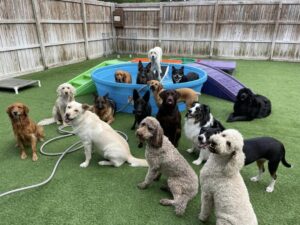Puppy Kindergarten for young puppies (age 8 – 16 weeks) can be so valuable, not only to the puppy, but to parents also. Finding care for puppies at this age is such a struggle for people who work outside of the home. Puppies are just not meant to be alone for a long workday. Our goal is to not only address this need, but to also offer a program that will assist parents with socialization and training.
One of the primary considerations in a program like this is safety. Safety for young puppies in daycare is of utmost importance. Puppy programs should not be offered unless these considerations are addressed in a manner that will ensure the safety of the puppies. There are several factors that make this different than daycare for adult dogs. I’d like to address these and let you know how our program handles each safety concern.
- Psychological/emotional safety. Puppies ride a roller coaster of emotions and fears. Your puppy may be confident one day and fearful and timid the next day. This is normal. Eventually it normalizes. But until that time, we must be considerate of what phase a puppy is in on any given day and adjust our approach so that we do no harm. Our team is expert in reading dog body language and have the ability to determine that yesterday’s feisty and confident puppy is feeling less sure of himself today. And while yesterday, he was comfortable meeting new puppies and people, today he will need more time and space….or maybe no new interactions. Pushing puppies into uncomfortable situations can cause lasting phobias. But recognition of discomfort and allowing space and time will help to develop confident puppies.
- Fatigue. Wearing our puppies out seems like a great idea when they are so active and rambunctious. But when is it too much? Puppies need rest and if they are in an active environment like a daycare, it is even more important. Fatigue can enhance the risk of joint injuries and can also create a negative association with being away from home. In our program, your puppy will have periods of activity offset by bigger periods of rest. As your puppy ages, they will be able to handle more periods of activity with less rest.
- Joint Safety. Joint spaces are not fully developed in some dogs until two years of age. This needs to be considered in a daycare environment, especially prior to 6 months of age. Too much rough housing, excessive jumping, and unsupervised play can be detrimental, and injury can happen. Rest periods and supervision are effective management tools for this safety concern and are a part of our program.
- Contagious Illness. Puppies, just like adult dogs can be susceptible to viruses. Fortunately, many of them can be prevented with vaccines. You may have heard it is not safe for your puppy to be in public places until they have received all of their vaccinations at age 16 weeks. This is not necessarily true. We encourage you to research this further. It is our opinion and the opinion of many Veterinary healthcare professionals that the benefits of early socialization far outweigh the small risk of your puppy contracting a contagious illness. Here are some of the contagious illnesses that should be considered.
- Distemper/Parvo: Puppies develop immunity from their mother (assuming Mom was vaccinated) while still in the womb and then we augment this protection with a series of vaccinations, up until 16 weeks of age. Even though the last injection is not until 16 weeks, your puppy is already protected based on the vaccines already received. This maternal protection along with the first vaccinations allow your puppy to be social in controlled environments such as a daycare that requires all participants are fully vaccinated and limit exposure to the adult dogs until further immunity is provided by the 2nd vaccine.
- Bordetella: This is a bacterial upper respiratory infection that is very uncommon in dogs today. This is mostly due to the fact that there is a vaccine that will help to prevent it. This vaccine can be given at 8 weeks of age and we require it prior to attendance in our program.
- Canine Cough: This is a generic term to describe what is usually a bacterial upper respiratory infection. We liken it to the common cold. If you are out and about enough or if you live with school-age children, you are at risk of getting colds. It is the same with dogs. It is usually harmless and is not a significant threat to puppies greater than 8 weeks old, as long as they are otherwise healthy. There is no vaccine to prevent this. While a pain in the behind because your puppy will not be able to participate in daycare for a few weeks, this is a relatively harmless issue.
- Play All Day has consulted with our Veterinary partner on vaccination timing for puppies that will be entering our program. This timing is discussed with each parent prior to starting daycare to ensure that their puppy is protected.
- Play All Day only accepts dogs into our regular daycare program that are fully vaccinated. We have cleaning policies that ensure all surfaces and equipment are cleaned nightly with agents that kill the most common viruses that affect dogs. Your puppy is much less likely to catch a contagious illness at our daycare than at a dog park, public parks, pet supply store, or other stores that accept dogs.
Risk vs Benefit
So, as you can see, there are risks associated with your puppy attending daycare. But, the risks can be managed. And if managed, they really aren’t that bad. I come from a healthcare background. Risk vs Benefit is a part of everyday discussions in healthcare. You have a health condition and a medication can help. The medication has many side effects (risks), but it will also help you feel better or possible give you longer life (benefits). If we liken this to puppy daycare, you can consider the risks of daycare and then compare them to the benefits. I’ve listed the risks and have given you our means of addressing and mitigating each risk. But what are the benefits of early puppy daycare? Do they justify the risks?
No surprise here, I say yes, they do. We’ve been providing daycare since 2011 and in that time, we have seen many of the side effects of under socialized puppies. We have seen dogs who are fearful of other people, dogs, and novel situations. I can’t say that this is totally caused by under socialization, but the lack of socialization was a contributor. I also see adolescent dogs with no manners, no impulse control, and general lack of training. The benefit of training puppies at this early age is huge. They are sponges and they learn early on to practice good behaviors instead of practicing negative behaviors. And for those who work, the benefit of not having your puppy alone and in a crate for long periods of time is huge.
But don’t take my word on it. The American Veterinary Society of Animal Behavior released a position statement on the risk vs benefit of early puppy socialization and recommend early socialization classes/opportunities.
Getting a puppy is a big decision and a big commitment. Investing in their mental and physical well-being early on will pay off in the end. I would never consider taking my puppy to a daycare unless I knew that the facility was aware of all the risks and had solid plans in place to mitigate risk and to provide the best possible environment. You can rest assured that Play All Day is aware of the safety concerns and has developed a program that will benefit you and your puppy for years to come.








